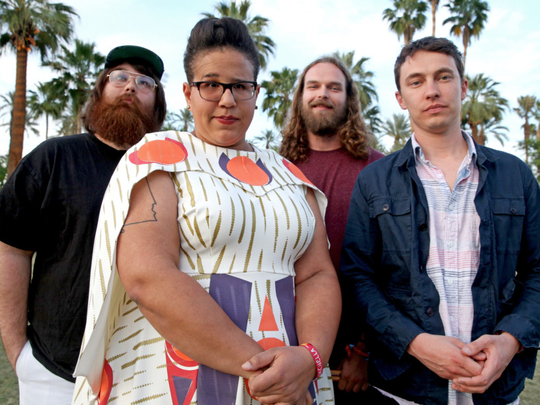
So many promising music careers are tripped up by the challenge of following a successful debut that its perils are an industry cliche.
Now the Alabama Shakes face this unavoidable rite of passage. The bar band from Athens, Alabama, with electrifying frontwoman Brittany Howard sold 737,000 copies of its first disc, earned three Grammy nominations, performed twice on Saturday Night Live, played for President Obama and earned enough critical hurrahs to fill a trunk.
Faced with the choice of fulfilling or confounding expectations with its new Sound & Color (to be released Tuesday), the Shakes chose the latter. The band is challenging its audience to move forward, almost defiantly so. During its first Coachella performance earlier this month, the set list notably did not include Hold On, Hang Loose or Always Alright, three of the young act’s best-known songs.
“We knew some people would probably want a similar record and there were some people who would probably be frustrated if we did something similar,” said guitarist Heath Fogg, neatly summarising the classic second album dilemma. “There’s no point in trying to please anybody other than ourselves.”
The vibraphone that heralds the album-opening sound collage seems a signal to check preconceived notions at the door. The spacy Gemini reflects the early 1970s movie soundtracks that Howard claimed as an influence, This Feeling echoes Curtis Mayfield, Shoegazer is a driving rocker that belies its reflective title and the woozy Dunes feels like a Southern summer day.
Both Gimme All Your Love and Miss You have dramatic shifts in tempo, the latter with an early favourite for lyric of the year: “I’m going to miss you and your Mickey Mouse tattoos.”
The band describes the adventurousness of Sound & Color as less a strategy than a reflection of the creative process.
Howard said that when she began writing songs, she quickly got bored because it seemed she was trying to write songs that were familiar, that sounded like things she had already written. That self-awareness freed her to experiment more.
“It’s a pretty eclectic mixed bag of things that we like,” Howard said. “It wasn’t intentional. I think we just had grown up as artists and players. There’s so much that we are into and so much that we like. The roots of our music will always be there, because that’s how we get along with each other. But there are so many languages, as far as music goes, that we can speak with to one another.”
Howard said she didn’t want fans to think that the band is leaving anything behind. “It’s just there and it’s more,” she said.
The success of the Boys & Girls album was clearly head-spinning for Alabama Shakes.
“It was almost overnight that things changed dramatically,” Fogg said. “We had been working on this material for years but when it got out into the public, things changed a lot, and they changed very quickly.”
He spoke from California, between Coachella gigs. The Alabama Shakes had just returned from Australia, for its second time. They packed a career’s worth of dreams into a short period of time. Fogg couldn’t get over seeing the band’s music being reviewed and discussed in so many places. Even if it was mostly positive, it was still disconcerting.
The publicity complicated the Shakes’ relationship with its first single, Hold On. The song was heralded as a revival of the Muscle Shoals soul sound, and “revivalist” is a dirty word in their book. The band considers it a quirky indie rock song, he said.
“We were getting a lot of attention for one song that I don’t think any of us felt defined us as a band,” he said. “People were making a lot of generalisations about us that we didn’t agree with, based on that one song.”
Despite some bumps, the band appreciates what success has brought them. The quartet, which also includes bass player Zac Cockrell and drummer Steve Johnson, can supplement their sound with additional players. And music isn’t just a day job or night job. It’s their only jobs.
“This business, the music business, you have to understand why you’re in it, what you’re doing,” Howard said. “Because it’s so consuming and kind of treacherous. It can be no fun. I think we all know that we want to stay genuine to ourselves and understand why we want to make music. Music is about learning, it’s about growing and, if you’re in a group, it’s like family.”












